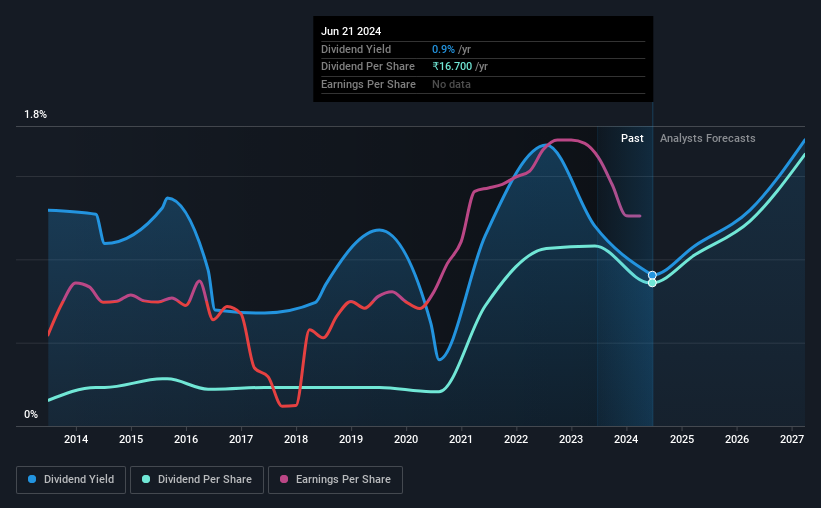- India
- /
- Telecom Services and Carriers
- /
- NSEI:TATACOMM
Tata Communications' (NSE:TATACOMM) Dividend Is Being Reduced To ₹16.70

Tata Communications Limited (NSE:TATACOMM) has announced that on 16th of August, it will be paying a dividend of₹16.70, which a reduction from last year's comparable dividend. This payment takes the dividend yield to 0.9%, which only provides a modest boost to overall returns.
See our latest analysis for Tata Communications
Tata Communications' Dividend Is Well Covered By Earnings
The dividend yield is a little bit low, but sustainability of the payments is also an important part of evaluating an income stock. Based on the last payment, Tata Communications was quite comfortably earning enough to cover the dividend. This indicates that quite a large proportion of earnings is being invested back into the business.
The next year is set to see EPS grow by 179.6%. Assuming the dividend continues along recent trends, we think the payout ratio could be 21% by next year, which is in a pretty sustainable range.

Dividend Volatility
While the company has been paying a dividend for a long time, it has cut the dividend at least once in the last 10 years. Since 2014, the dividend has gone from ₹3.00 total annually to ₹16.70. This works out to be a compound annual growth rate (CAGR) of approximately 19% a year over that time. Tata Communications has grown distributions at a rapid rate despite cutting the dividend at least once in the past. Companies that cut once often cut again, so we would be cautious about buying this stock solely for the dividend income.
The Dividend Looks Likely To Grow
Growing earnings per share could be a mitigating factor when considering the past fluctuations in the dividend. We are encouraged to see that Tata Communications has grown earnings per share at 37% per year over the past five years. The company's earnings per share has grown rapidly in recent years, and it has a good balance between reinvesting and paying dividends to shareholders, so we think that Tata Communications could prove to be a strong dividend payer.
We Really Like Tata Communications' Dividend
It is generally not great to see the dividend being cut, but we don't think this should happen much if at all in the future given that Tata Communications has the makings of a solid income stock moving forward. By reducing the dividend, pressure will be taken off the balance sheet, which could help the dividend to be consistent in the future. All in all, this checks a lot of the boxes we look for when choosing an income stock.
Market movements attest to how highly valued a consistent dividend policy is compared to one which is more unpredictable. At the same time, there are other factors our readers should be conscious of before pouring capital into a stock. To that end, Tata Communications has 3 warning signs (and 1 which is significant) we think you should know about. If you are a dividend investor, you might also want to look at our curated list of high yield dividend stocks.
Valuation is complex, but we're here to simplify it.
Discover if Tata Communications might be undervalued or overvalued with our detailed analysis, featuring fair value estimates, potential risks, dividends, insider trades, and its financial condition.
Access Free AnalysisHave feedback on this article? Concerned about the content? Get in touch with us directly. Alternatively, email editorial-team (at) simplywallst.com.
This article by Simply Wall St is general in nature. We provide commentary based on historical data and analyst forecasts only using an unbiased methodology and our articles are not intended to be financial advice. It does not constitute a recommendation to buy or sell any stock, and does not take account of your objectives, or your financial situation. We aim to bring you long-term focused analysis driven by fundamental data. Note that our analysis may not factor in the latest price-sensitive company announcements or qualitative material. Simply Wall St has no position in any stocks mentioned.
Have feedback on this article? Concerned about the content? Get in touch with us directly. Alternatively, email editorial-team@simplywallst.com
About NSEI:TATACOMM
Reasonable growth potential and fair value.
Similar Companies
Market Insights
Community Narratives



